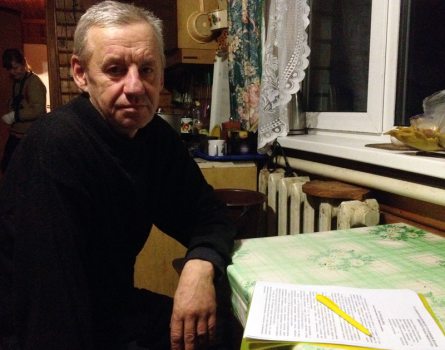State does not want to admit its guilt in illegal imprisonment of Mikhail Hladki
For several years already Mikhail Hladki has been seeking recognition of his right to compensation for materials and moral damages and prosecution of those who had participated in the proceedings in his case.
In 2003, M. Hladki was wrongfully convicted for the murder of his brother. He wants to receive a compensation from the state, because as a result of the unfair verdict he actually lost seven years of life: he spent five of them in jail and two more at correctional labor.
In 2015 he has already filed several appeals to various state agencies ranging from the regional court to the Office of the Prosecutor General. Each time the state bodies invent new justifications for their reluctance to confess their mistakes.
"The court came to the correct conclusion that M. Hladki cannot be regarded as a person who are entitled for compensation, as while giving a confession about his brother's murder, he voluntarily incriminated himself in the crime, thereby preventing the establishment of the true circumstances of the criminal case," reads the response of Judge of the Minsk Regional Court M. Boika.
All agencies, to which Mr. Hladki has appealed, refer to the alleged self-incrimination and its wide interpretation. However, Mikhail Hladki argues that he was sure that he had killed his brother. Hitting on his body with an axe he didn't know that the brother had been already dead. By that time Mikhail's brother had been dead for a day already. As a result of a superficially conducted investigation, the investigators didn't pay enough attention to the results of the forensic examination. The investigation and the court ignored serious contradictions in Mikhail Hladki's testimonies.
The man appealed to the Supreme Court of the Republic of Belarus in March 2015, appealing the actions of the judicial bodies and asking to conduct an appropriate inspection and issue disciplinary penalties to the workers of law-enforcement agencies and judges who showed their incompetence while investigating his case. However, Deputy Chair of the Supreme Court V. Kalinkovich refers to “self-incrimination” as the main reason to dismiss his appeal: “Taking into account that you confessed to the crime, the re are no grounds to draw the judge of the Minsk District Court to disciplinary responsibility."
The reply from the Prosecutor General's Office of the Republic of Belarus also contained a reference to his confession:
"While studying the case materials, the Office of the Prosecutor General established that during its consideration by the Minsk District Court and the town of Zaslaŭl the materials of the case contained evidence pointing at the killing of V. Hladki by You, including Your own confession at the preslimnary investigation and at the court, agreeing with the results of objective examination of the scene and expert examination of the corpse of V. Hladki, the ax which was found at the scene and clothes with stains of blood, seized from You, whose examination showed that this blood could belong to the deceased,” wrote Deputy Prosecutor General A. Stuk.
Lawyer of the Human Rights Center "Viasna" Pavel Sapelka notes that the peculiarity of Mr. Hladki's situation is not only in the wording, used by the state agencies, but also in the approach to the assessment of the mistakes of the law machinery and courts in general, as far as the both of them very reluctantly confess their mistakes. The case of Mikhail Hladki is an eloquent example:
"When Mr. Hladki testified during the preliminary investigation and in court, he gave the testimony which seemed true and objective to him. It is totally incorrect to tell that it is self-incrimination, which can serve as the reason for depriving him of a compensation for the inflicted harm. Self-incrimination is aimed at giving knowingly untrue information for some reasons, such as to save another person from punishment or in order to receive compensation. This is evidently not Mikhail Hladki's case.”
Pavel Sapelka draws attention to the fact that Mikhail Hladki hasn't yet used all opportunities to restore his rights, but there is already a visible trend showing that the state doesn't want to confess its guilt of the illegal conviction, and puts all moral and juridical responsibility on Mr. Hladki. The first verdict, as a result of which he was sentenced to imprisonment, hasn't been thoroughly reviewed.
Let us remind that in 2003 Mikhail Hladki was sentenced to 8 years of imprisonment for killing his brother. At that time he pleaded guilty, being sincerely convinced that he had killed his brother. In 2012 the initial verdict was abolished due to the absence of corpus delicti in his actions. Eduard Lykau was found guilty of a series of killings including that of Viktar Hladki and was sentenced to death. Mikhail, in his turn, started taking measures in order to get the state recognize his right to a compensation for moral and materials harm. He is supported by the Human Rights Center “Viasna” within the framework of the campaign “Human Rights Defenders against Death Penalty”.


















